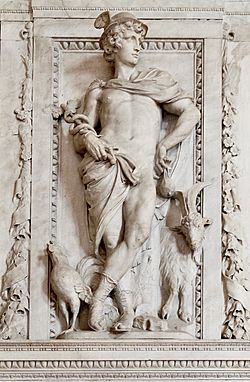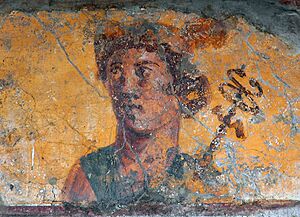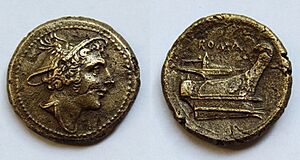Mercury (mythology) facts for kids
Quick facts for kids Mercury |
|
|---|---|
| God of financial gain, commerce, eloquence, messages, communication, travelers, boundaries, luck, trickery, merchants, thieves | |
| Member of the Dii Consentes | |

Mercurius by Artus Quellinus the Elder
|
|
| Planet | Mercury |
| Symbol | Caduceus, winged sandals, winged hat, tortoise, ram and rooster |
| Day | Wednesday (dies Mercurii) |
| Personal information | |
| Consort | Larunda |
| Children | Lares |
| Parents | Maia and Jupiter or Caelus and Dies (Cicero and Hyginus) |
| Greek equivalent | Hermes |
| Etruscan equivalent | Turms |
Mercury (in Latin, Mercurius) was a very important god in ancient Roman religion and mythology. He was one of the 12 most powerful gods in the Roman pantheon.
He was known as the god of many things. These included making money, trade, speaking well, and sending messages. He also looked after travelers, helped with communication, and was linked to luck and even trickery. Mercury was also believed to guide the souls of the dead to the underworld.
Contents
Who Was Mercury?
In Roman stories, Mercury was usually thought to be the son of Maia and Jupiter. Maia was one of the seven daughters of the Titan Atlas. Some stories also say his parents were Caelus and Dies.
Mercury is often shown holding a special staff called a caduceus. This staff has two snakes wrapped around it. Like his Greek counterpart, Hermes, Mercury received this staff as a gift from the god Apollo.
Mercury's Name
The name "Mercury" might come from Latin words related to trade. Words like merx (meaning "merchandise") and mercari (meaning "to trade") are similar. This makes sense because Mercury was the god of merchants and business.
Mercury's Story and Role
Mercury became an important god around the 4th century BC. He shared many traits with the Greek god Hermes. He wore winged shoes called talaria and a winged hat called a petasos. He also carried his famous caduceus, the staff with two snakes.
Mercury was often seen with certain animals. A rooster was common, as it announced the new day. A ram or goat symbolized new life and growth. A tortoise was also linked to him, because Mercury was said to have invented the lyre (a musical instrument) from a tortoise shell.
Like Hermes, Mercury was the god of messages and speaking well. He was also very important for trade, especially the grain trade. He protected travelers and was even known as the god of thieves. People also saw Mercury as a god of good fortune and success in business. He guided the souls of people who had died to the afterlife. The ancient writer Ovid also wrote that Mercury carried dreams from the valley of Somnus to people while they slept.
Old findings from Pompeii show that Mercury was one of the most liked Roman gods. His image was even put on early bronze coins of the Roman Republic.
Mercury's Temple
Mercury had a temple in Rome. It was located near the Circus Maximus, between the Aventine and Palatine Hills. This temple was built in 495 BC.
The temple was officially opened on May 15, 495 BC. It was a good spot for a god of trade and travel because the area was a busy center for business and also a racetrack. The temple was also seen as a place for Mercury to act as a mediator. This is because it stood between the patrician (upper class) center and the plebeian (common people) area.
How People Worshipped Mercury
Mercury had his own special festival called the Mercuralia. This festival took place on May 15th. During the Mercuralia, merchants would sprinkle water from Mercury's sacred well on their heads. This well was located near the Porta Capena.
Mercury in Modern Culture
Mercury has appeared in many modern stories and media.
- He was in the first comic book story published by Jack Kirby. This story, called Mercury in the 20th Century, appeared in Red Raven Comics in 1940.
- The United States' "Mercury dime" coin, made from 1916 to 1945, actually shows a winged Liberty. However, it got the name "Mercury" because the figure on the coin looked like the god.
- Mercury is also a character you can play in the video game Smite. This is a third-person multiplayer online battle arena game.
See also
 In Spanish: Mercurio (mitología) para niños
In Spanish: Mercurio (mitología) para niños



